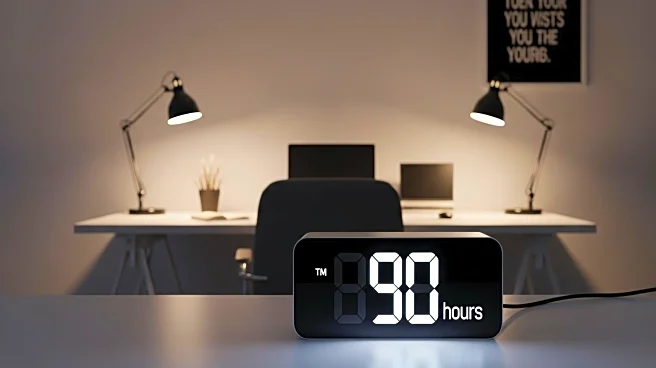What is the story about?
What's Happening?
Lucy Guo, co-founder of ScaleAI and the youngest self-made female billionaire, has sparked debate with her advice to startup founders to adopt a 90-hour workweek. Guo, whose net worth increased to $1.3 billion following a major investment from Meta, is known for her rigorous daily routine, which includes early morning workouts and working until midnight. She argues that cutting out time-wasting activities like doom scrolling or watching TV can help achieve work-life balance. Guo's recommendation for intense work hours echoes the '996' culture prevalent in China's tech industry, where employees work from 9 a.m. to 9 p.m., six days a week. Her stance has drawn criticism from mental health advocates and startup veterans who caution against the potential negative impacts of such demanding schedules.
Why It's Important?
Guo's advice highlights the ongoing debate about work-life balance in the tech industry, particularly for startup founders. Her approach underscores the pressure to succeed in a competitive environment, where extreme dedication is often seen as necessary for success. However, the criticism from mental health advocates points to the potential risks of burnout and stress associated with such demanding work schedules. This discussion is significant as it reflects broader concerns about employee well-being and sustainable work practices in the fast-paced tech sector. The conversation may influence how startups structure their work environments and prioritize employee health.
What's Next?
The debate around Guo's work philosophy may prompt further discussions on the balance between productivity and mental health in the tech industry. Startup founders and industry leaders might reconsider their approaches to work schedules, potentially leading to more flexible and health-conscious work environments. Additionally, as the conversation continues, there may be increased advocacy for policies that support mental health and work-life balance in the workplace.
Beyond the Headlines
Guo's stance raises ethical questions about the expectations placed on employees in high-pressure industries. It also highlights cultural differences in work practices, as seen in the comparison to China's '996' culture. The long-term implications could include shifts in how work is perceived and valued, potentially leading to changes in corporate culture and employee rights.
















